Graduate Student Spotlights
Takako Hirokawa - Ph.D. Student in Electronics & Photonics
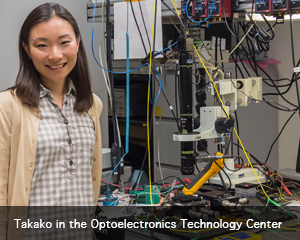
- Hometown: Ridgefield, CT
- Degrees: BS degrees in Engineering Physics and Applied Math from the University of Colorado Boulder; MS degree in Electrical and Computer Engineering from UCSB
- Degree sought from UCSB: PhD, 6th year
- Group/Advisor: Clint Schow / Optoelectronics Technology Center
- Main area of research: Photonic Integrated Circuits
- Research interests: Silicon Photonics, Photonic Switches, Silicon Photonic Modulators
- Master's thesis topic: Photonic Switches
- Publication list: Hirokawa's ResearchGate profile
- Important conferences attended: I went to Optical Interconnects recently to present a talk. I’ve previously attended The Optical Networking and Communication Conference & Exhibition (OFC) and IEEE Photonics Conference
- Types of financial assistance received: Teaching Assistant (TA) for the first year and a half and Graduate Student Researcher (GSR) since then
- Awards & honors received: Outstanding Physics TA Award
- UCSB student organizations: Photonics Society at UCSB
- Professional memberships: Institute of Electrical and Electronics Engineers (IEEE) Photonics Society, The Optical Society (OSA), Society of Photo-Optical Instrumentation Engineers (SPIE)
- Hobbies: Figure skating, cycling, walking on the beach, educational outreach
- Interesting aside about Takako: I took two years off between undergrad and grad school. During those two years, I spent the morning of a typical day on the ice practicing or teaching, and the afternoon doing Physics Education Research.
Favorite things about
- ECE department: The highly collaborative environment!
- UCSB: The variety opportunities you can find outside your research, such as professional development, teaching, and outreach
- Santa Barbara: The weather. People often ask me how I can study if the weather is always nice, and I always say that because the weather is always nice, you don’t feel like you’re missing out if you happen to be stuck in lab all day.
Tell us about your research
I work on two main projects that fit under the general theme of developing Silicon Photonic Integrated Circuits for data center applications. With the continued global increase in demand for more data and most of the global IP traffic occurring in the data center, we will need to move towards faster communication links in the data centers. Both my projects look to address how we transport increasing data rates in an energy efficient manner. The first project was funded through AIM Photonics and is developing a wavelength-selective silicon photonic switch. I have designed ring-based switches with special care taken to make sure that it can be driven by a custom electrical IC and that it is compatible with standard methods of introducing electrical and optical signals. The second project is funded by ARPA-E that aims to develop analog coherent optical links. This includes InP and Si PIC transmitter and receiver development. I design and test Si photonic Mach-Zehnder modulators on this project and on the system analysis of the energy efficiency of the links.
In addition to those two main projects, I am also involved in a project for free space optical link for cryogenic operation, which has involved designing and testing silicon ring modulators.How and why did you get into your area of research?
In undergrad, I was studying physics and worked in a couple of research labs that did Atomic, Molecular, Optical Physics (AMO). I loved it but was worried about getting a job in AMO after getting a PhD because it’s a very competitive field. I decided I wanted to pursue something a little more engineering-y. I found that photonics was pretty much exactly what I was looking for in that I still got to manipulate light in interesting ways, and that whatever highly specific skills I learned during my PhD would help me get a job afterwards.
Why did you select UCSB and ECE in regards to your research?
It’s hard not to argue with the caliber of the photonics faculty or the location.
What do you find rewarding about your research?
Knowing that I’m working on relevant, tangible, real-world problems is the most rewarding aspect of my research. It’s doubly rewarding when someone at a company, for example, contacts you asking to know more about the details of your project.
UCSB prides itself on its collaborative atmosphere, give some examples of how you collaborate
I love that the department is highly collaborative. Since starting research here, I have worked with eight or nine ECE faculty in varying capacities. For most of the faculty I’ve worked with, it’s because they are a PI on a project that I’m working on. For the other few faculty members, it’s because they have more expertise and I needed to their advice on what to pursue in my project. On the AIM Photonics switch project, I worked with two Bowers students and a Theogarajan student and with a lot of input from Prof. Adel Saleh and Dr. Roger Helkey from the on-campus Institute for Energy Efficiency. For the ARPA-E project, I regularly work with members of Klamkin group, Buckwalter group, and Saleh group, in addition to my own research group. Though Prof. Larry Coldren is retired, he still advises on this project and often has insightful input.
Thoughts on working in a group research environment and your experience working with an advisor
For the first couple of years I was the only person in my group or the only person in my group doing research. But from the very start, I’ve worked with people in other groups on projects, so when more people started joining my group and doing research, it didn’t seem too different from what I was doing other than there were more people you could work with and rely on. As for my advisor, Prof. Clint Schow, he’s the best, and I’m not just saying that because he’s paying me. After having had an awful research advisor from a previous life, I wanted to make sure that I worked for someone who I was unafraid to ask my “dumb” questions and who I got on with personally. Thankfully, Clint is very approachable and helpful, —he’ll even come into lab to help with your experiments! —and takes all my super basic circuits questions beyond Ohm’s law in stride.
Where will your research take you next?
I should figure that out soon, but I’d like to continue doing research in industry because I’d like to have a different perspective on research than the one you get from academia. But I’d also like to come back to academia because I love teaching.
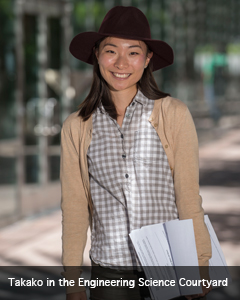
Takako's thoughts on the academics at UCSB
Strengths of the graduate program
The strength lies in the fact that there is a highly collaborative environment. The exchange of ideas with people in other groups at UCSB makes everyone’s research better.
Favorite course
I really enjoyed the ECE 228 series (Fiber Optic Communications / Fiber Optic Components and Systems) on fiber optic communications. As someone with a Physics background, it was eye-opening to see the impacts of physics of these materials had on technology.
Experience with the graduate exams
For the screening exam, study with other people so that you get used to talking about solutions aloud. For the qualifying exam, make and present a timeline of the necessary steps to complete your proposed project. It puts realistic parameters and expectations on your project for yourself and your committee.
Describe your experience as a Teaching Assistant (TA) and Graduate Student Researcher (GSR)
I spent the first year and a half (5 quarters + a summer) being a TA in the physics department. I chose to work in the physics department because I have a degree in physics and had done two years of physics education research. I taught most of the intro Physics for Engineers courses (PHYS 1-4) as well as the pre-med sequence (PHYS 6A-C). I had a great experience, compounded by the fact that I was able to teach the same year of undergraduate engineers for 4 consecutive quarters. I felt like I grew as an instructor while they grew into capable and resourceful students. Watching students evolve into better versions of themselves was one of the most rewarding things to watch as a TA. I don’t teach in any formal capacity anymore, but schedule-permitting, I take any educational outreach opportunity I can get to continue teaching in some way.
Life as a graduate student
Quality of life as a graduate student and how you balance school, work, social, and family life
In addition to doing research, I am very active in the student organization the Photonics Society. It is the joint student chapter of the IEEE Photonics Society, OSA, and SPIE at UCSB. We host seminars by speakers we invite, organize an annual event such as last year’s Light Science Workshop or this year’s Banquet, and organize a yearly Women in Photonics Week. We are very active in educational outreach; we develop self-contained educational activities and run them several times a year in the SB community, reaching roughly a thousand people a year in the area. Being active in the Society has helped me network with others in the highly active local photonics community, as well as with members of the professional societies at conferences. Outside research and Photonics Society-related activities, I like to try to keep as regular a schedule as possible (i.e. business hours) so that when deadlines come up, I can really push to complete project milestones. I love doing research and the projects that I’m working on, but I realized that for me, in order to continue loving my research and having the energy to push through difficulties in my projects, I need to take time off from doing research.
What is your social life like and where have you lived?
I lived in San Clemente my first year because I didn’t know anybody and thought it was a good opportunity to meet new people. I now live roughly a 15 min bike ride off campus in Goleta. I love that I can ride my bike to campus. The bike infrastructure on campus is very impressive, and easy to take for granted!
What did you do over summer break?
I plan on working on my research this summer, like most summers I’ve been here. The first summer I was here I TAed, and last year I did an internship at IBM Watson.
Advice to prospective graduate students
I’m very passionate about educational outreach and try to encourage other grad students to try it out. It’s a way to share your expertise with the general public (mostly pre-university students). In addition, when you try explaining your research to kids and/or their parents, it forces you to think about your projects from a different perspective, which as invaluable ability for a researcher.
Joseph McMahan – M.S. / Ph.D. Student in Computer Engineering
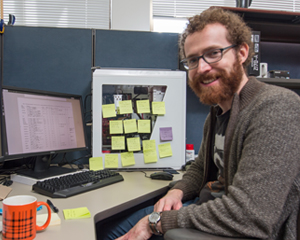
- Hometown: Petaluma, CA
- Degree: B.A. in Physics from Princeton University
- Degree Sought from UCSB: M.S. / Ph.D. 6th year
- Graduate Study Area: Computer Architecture
- Advisor / Lab: Tim Sherwood / ArchLab
- Research Interests: Architecture, Formal Methods, Security, Side Channels
- Master's Thesis or Dissertation Title or Topic: The Zarf Architecture
- Joseph's Publication List: http://cs.ucsb.edu/~jmcmahan/research.html
- Important Conferences Attended: International Symposium on Computer Architecture (ISCA); International Conference on Architectural Support for Programming Languages and Operating Systems (ASPLOS) – presentation; IEEE/ACM International Symposium on Microarchitecture (MICRO); IEEE International Symposium on Hardware Oriented Security and Trust (HOST) – presentation
- What types of Financial Assistance have you receive? Teaching Assistant (TA) and Graduate Student Researcher (GSR)
- Awards & Honors Received: National Science Foundation (NSF) Graduate Research Fellowship Program (GRFP) honorable mention; UCSB Computer Science Summit 2017 Distinguished Graduate Student Presentation; IEEE Micro Top Pick 2018
- Professional Memberships: Association for Computing Machinery (ACM), Institute of Electrical and Electronics Engineers (IEEE)
- Hobbies: Coffee, music, video games, 3D printing, and poetry
- Interesting Aside about You: I recognize every song on modern rock radio stations
Favorite things about
- Electrical and Computer Engineering Department: Culture of collaboration! It's so easy to reach out to other labs and get their expertise on your projects.
- UCSB: Ocean views – very calming during stressful research
- Santa Barbara: Quaint downtown
Tell us about your research
My research has been in the intersection of formal methods and hardware design, with occasional security thrown in --- essentially, I want to build hardware systems that we can be sure about. This manifests both in new techniques for analyzing circuits and designs, and well as new architectures supporting software level reasoning.
How and why did you get into your area of research?
I loved computer science as an undergraduate, but in particular I was drawn to systems and architecture. Once I was a grad student, I fell into my main project almost by accident: I attended a meeting with my advisor and a few others about a project they were starting up, and I offered my hand in helping out. Soon enough, I was the main contributor and the topic would become my PhD thesis. I've enjoyed the casual approach to research in my lab; falling into new projects is exciting and fun!
Why did you select UCSB and your department in regards to your research?
It was the right combination of a highly regarded program, quality faculty, and good environment.
What do you find rewarding about your research?
Knowing that we're breaking ground now on things that will have impact much farther down the line. It can be hard to take motivation from short-term results, but good research is often new and strange at first; I find it rewarding to know that what we do now will have increasing influence as concerns of security and correctness become more and more important.
UCSB prides itself on its collaborative atmosphere, give some examples of how you collaborate
I'm in touch with my advisor a few times a week. He's not afraid to get down into details and get his own hands dirty with research. This makes for a really productive environment, because we have constant feedback and encouragement. We fail a lot – that's just part of research – but Tim teaches us to fail quickly and move on.
Other faculty have been very receptive to all kinds of collaboration. I've worked most closely with the Programming Languages lab; several students there have been instrumental to the research I've done so far. My PhD wouldn't have progressed like it did without them. The Verification Lab has also had overlapping research interests, and been open to collaboration. We've worked with them on a couple papers now.
Kicking off research with another group is remarkably easy. It's been as simple as an email saying, “Hey I've got this interesting project; can we talk about it?” We've worked with groups in security, cryptography, software systems, and others. It takes a lot of pressure off of the work you do when you have access to so much expertise in other people!
I've also collaborated with students outside of UCSB. It was a great, successful experience; we wrote an ISCA paper together. In addition, our lab has worked with some folks from Cisco Systems on software and circuit analysis.
Thoughts on working in a group research environment and your experience working with an advisor
I've had a great time in my research group, and I owe a lot to my advisor. Having lab-mates to bounce ideas off of is crucial, I feel, in making progress in what you're doing. I don't think I could have done over half of what I've accomplished if I'd been working alone. Tim has been a great and hands-on advisor, while also avoiding putting too much pressure on his students. It's made for a great and productive research environment. More than a good advisor, he's also a good person, which has been important too.
Where will your research take you next?
My goal is to become a professor at a research university. I love both research and teaching, so it seems like the ideal! The next step is a postdoctoral fellowship for a couple years before I go on to faculty applications.
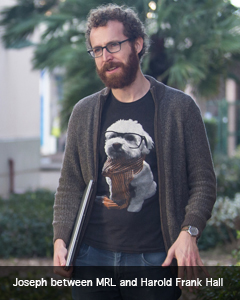
Joseph's thoughts on the academics at UCSB
Strengths of the graduate program
Favorite courses
Graduate Operating Systems with Rich Wolski. Getting to build something large, with many moving parts, from the ground up was an awesome experience, and part of what I love about systems. Close runners-up are Architecture with Tim Sherwood and Modern Programming Languages with Chandra Krintz. Those three courses, together, shaped my skills and knowledge as a graduate student.
Experience with the screening exam, qualifying exam, defense exam, and working on your thesis / dissertation
I found the screening exam to be a relatively painless experience. I enjoy oral examinations (there's always the opportunity to turn it around and ask questions of your interviewer), and having a set of them was a good test of my knowledge. The qualifying exam stands out much more in my mind; it feels like a lot more is on the line, because it's your own original research you're proposing and defending. Despite the anxiety, the faculty on my committee were not only kind, but insightful in their criticisms. Their responses made me feel like I was doing impactful research.
Describe your experience as a Teaching Assistant (TA) and Graduate Student Researcher (GSR)
My first year as a grad student, I didn't do any research. I was a TA and I took graduate courses. I taught ECE 154A for one term and ECE 152A for two. For the first I taught a section; for the second, a lab. Later on, I taught a section of CS 160 when my advisor taught it. I thoroughly enjoy teaching: passing on knowledge and instructing students in how to build and create is very rewarding. Running a lab section is a bit different; you don't have the opportunity to lecture in the same way, but it tends to be much easier to get involvement from students — there's much less pressure to talk to the TA in a lab versus a section. That extra student contact makes teaching a lab worthwhile as well. Since I worked as a TA my first year as a PhD student, I saw my former students go on to take other courses and graduate, and had the pleasure of watching some of them become grad students themselves!
Life as a graduate student
Quality of life as a graduate student and how you balance school, work, social, and family life
Grad school gets a bad reputation for being all-consuming, and I've heard first-hand from people at other schools that it can definitely be that way – but here, I found it acceptable to take time for myself and not work 24 hours a day. It could be unique to UCSB, or the department, or my advisor, or some combination; in any case, it hasn't been too difficult to balance my personal and work lives. I don't want to make it sound like it's easy, because it's always a challenge to find balance, but I was expecting something much worse than what I experienced. I stay focused during the day, and take most nights and weekends for myself.
What is your social life like and where have you lived while at UCSB?
I have a core group of friends, mostly other graduate students, that I see regularly. I live in a cottage downtown on Bath street; before that, I rented a bedroom in a house in Goleta. Though I miss being able to bike to campus from Goleta, living downtown has been a wonderful experience. I live with PhD student in the English department, who constantly has insightful and interesting things to say, and isn't afraid to challenge my notions about the world.
My boyfriend is not a grad student; he's my main social outlet. Having people in your life that are not academics is really important: it helps keep you grounded and reminds you of the world outside your bubble. It also helps remind you that you're here by choice, which is a great motivator as a grad student.
What do you do over the summers?
A couple years ago, I had an internship at AMD Research in Seattle. It was a good time; I liked Seattle, and I might try to head back there for my postdoc! This past summer, I stayed on campus and did research. The summer is a great time to get work done because everything calms down so much. Even when you're not teaching or taking classes, things are more hectic during the academic year. The blend of relaxation and focus of the summertime is a great change of pace.
Advice to prospective graduate students
Don't be afraid of failure. Failing fast is probably the most valuable skill I've learned as a grad studeInt. As a researcher, most of what you do won't work. Learning how to not take those setback personally, how to pick yourself back up and try something new, is crucial. By failing quickly, you can cover more ground and find something that does work sooner --- the great trap is devoting months of research effort to something that turns out to be a dead end.
Brian Canty - M.S. Student in Controls
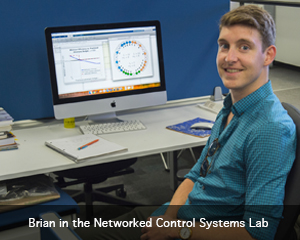
- Hometown: Huntington Beach, CA
- Degrees: B.S. Electrical Engineering - University of California, Santa Barbara
- Degree sought from UCSB: M.S. Electrical Engineering, 2nd year
- Group/Advisor: Jason Marden and Mahnoosh Alizadeh
- Main area of research: Game Theory
- Research interests: Distributed control, networked control systems, game theory
- Master's thesis title: "The Impact of Informed Adversarial Behavior in Graphical Coordination Games"
- Types of financial assistance received: Graduate Student Researcher (GSR) and Teaching Assistant (TA)
- Awards & honors received: UCSB undergraduate studies – CoE 2017 Valedictorian and 2015-2016 Roger Wood Endowment
- UCSB student organizations: UCSB Hyperloop and Tau Beta Pi
- Professional memberships: Institute of Electrical and Electronics Engineers (IEEE)
- Hobbies: Video games, comics, skateboarding, collecting vinyl records
- Interesting aside about Brian: I’m rigorously searching throughout California for the best bubble tea/boba pearls. In my spare time, I make the pearls from scratch.
Favorite things about
- ECE department: My fellow grad students. It’s been super easy getting to know everyone in the program, and it’s nice to see friendly faces throughout the day. To me, UCSB seems to have this magic that makes everyone more social. I look forward to meeting incoming grad students and welcome them to the club.
- UCSB: The bike infrastructure. I can get to anywhere I need to on my bike, which has saved me a ton in gas money. I do some of my best thinking on my bike, which has led to some major breakthroughs in my research. Additionally, I love the fragrant jasmine flowers planted all over campus; they’re my favorite kind of flower.
- Santa Barbara: The laid-back pace of life. Compared to the larger LA area where I grew up, life in general seems more relaxed up here. My schedule isn’t dictated by freeway traffic, and the populace seems to be in less of a rush. I feel like I can breathe easy here. This has been a great environment to live/work in.
Tell us about your research
I research the susceptibility of multiagent systems to outside influence. Agent interactions are modeled as a mathematical game, and I investigate if it is possible to modify the emergent behavior of a system by presenting agents with false information. On the other side of things, I investigate what measures can be taken by system designers to minimize susceptibility of their systems to external influence.
How and why did you get into your area of research?
During my undergraduate career, I discovered the world of controls and started taking classes in that area. I'm very into the idea of designing systems that manipulate the world around us in a smart, efficient way. My advisor, Jason Marden, invited me to his office out of the blue one day and introduced me to his research in applying game theory to system analysis/synthesis. It was a great fit with my interests, so I stuck around to do research during grad school.
What do you find rewarding about your research?
My research so far has been very theoretical, which has been a great opportunity for me to develop my ability to organize and present my thoughts in a mathematically sound way. When I look back even just a year, I'm amazed with how much I've grown as a researcher. I haven't had a chance to apply my research yet, but I hope to be able to contribute to the security of multiagent systems.
UCSB prides itself on its collaborative atmosphere, give some examples of how you collaborate
My advisors are very approachable and make a point to meet with me on a regular basis to assist me out whenever I need it. I feel very well taken care of, which I am thankful for. I share a large room with my fellow lab-mates, which has been a great environment for collaborating with each other and making friends. In fact, we routinely have other labs within the department visit us, which has let me meet new people and further develop my network here. If I have a question about a research area I'm not familiar with, I'm confident that I can talk to someone who not only knows more about it, but is happy to talk about it. The fabled collaborative atmosphere of UCSB is very much a real thing, which shines through in our department.
Where will your research take you next?
I hope to apply the skills I have learned at UCSB to a job in Industry. I don't know where I'm going to end up, but I'm confident that the programs I have been enrolled in here have given me the necessary tools to be successful.
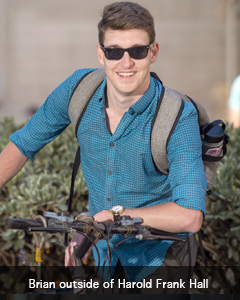
Brian's thoughts on the academics at UCSB
Strengths of the graduate program
Our faculty is world class and very available to work with students. Course enrollment is small, which gives us plenty of opportunity to interact directly with our professors during lecture. The courses I have taken have had an emphasis on exploring topics that we're interested in with the added guidance from our professors. I feel like I am given a great amount of freedom in the direction I take my education, and despite this I still benefit from professors who are willing to work with me on a one-on-one basis.
Favorite course
Dynamic Programming (ECE 271C) with my advisor, Prof. Marden. I swear it's not just because he's my advisor. The course covered a large amount of systems that I would consider non-traditional, such as shop inventories and tennis games (I was used to only working with mechanical systems before this class). Despite how different each system is from each other, there is still a collection of tools that dynamic programming provides that allow us to guarantee optimal performance, and I think that's incredibly powerful. For the final project, I got to design a controller that played Tetris, which was a blast.
Describe your experience as a Teaching Assistant (TA) and Graduate Student Researcher (GSR)
I have been both a GSR and a TA. As a GSR, I've been able to focus on my research and classes in a very natural way – classes are "minimally invasive", meaning work is assigned with the expectation that we are also engaged with research on the side, which allows for plenty of time to work on research. As a TA, I've written labs for one of our hardware/software interface classes as well as taught classes on digital signal processing and game theory. You really master the material when you have to teach it to others, and it’s incredibly rewarding when your students get it. The class sizes here are pretty small, so it wasn’t difficult to help anyone who needed it. I’m grateful I was given the opportunity to help students on the same journey through undergrad that I undertook years ago.
Life as a graduate student
Quality of life as a graduate student and how you balance school, work, social, and family life
I balance my school and work by setting boundaries. I plan in advance and keep to my schedule, which allows me to take evenings and weekends off for the most part. Having a good work-life balance is very important to me, as taking breaks keeps my mind sharp and lets me be productive at work. I find that since we have so much freedom with our schedules here, it is easy to maintain a rhythm.
What is your social life like and where have you lived?
I live in the Grad Student Housing, which has been my favorite place to live in the area so far. The location is great and the apartments have all the amenities I need, so I’m pretty cozy there. Life here in Santa Barbara is laid-back, with plenty of places to explore. On the weekends, I hang out with my fellow students. We’ve been checking out restaurants downtown for years and I still feel like I haven’t scratched the surface of what this place has to offer. Santa Barbara is also home to several festivals (such as the Earth Day Festival and Old Spanish Days) which keeps things pretty lively.
What did you do over summer break?
This past summer, I balanced research and travel. I prepared the final submission of my conference paper and then got to travel around Europe for a couple of weeks. I stopped in Italy and Germany, soaking up the history of the place (and the beer in Germany). This was my first trip outside of the states, so it was really interesting to see what life is like across the puddle.
Advice to prospective graduate students
UCSB is great because it allows for you to lead a very balanced life. Work and play coexist. I feel like there are more academic and social opportunities here than I know what to do with. Work hard with your fellow students and be sure to go explore the area with them when you get the chance.
Jorge I. Poveda – Ph.D. Student in Controls
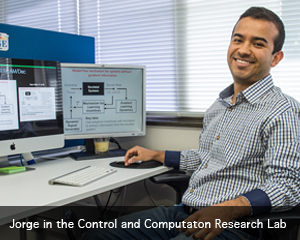
- Hometown: Bogotá, Colombia
- Degrees: B.S. in Electronics Engineering (2012), B.S. in Mechanical Engineering (2012), M.Sc. in Electrical Engineering (2013) from University of Los Andes, Colombia and M.Sc. in Electrical Engineering (2015), UCSB
- Degree sought from UCSB: Ph.D. (5th year)
- Group/Advisor: Andrew R. Teel
- Main area of research: Hybrid Dynamical Systems with Applications in Optimization, Learning, and Control
- Research interests: Feedback control, model-free optimization and learning, analysis and control of network systems and societal systems
- Dissertation title: " Robust Hybrid Systems for Control, Learning, and Optimization in Networked Dynamical Systems"
- Most important publication to date: "A Framework for a class of hybrid extremum seeking controllers with dynamic inclusions,” Automatica, 2017. Jorge's personal website & publication list – https://sites.google.com/site/jorgeivanpoveda/
- Important conferences attended: IEEE Conference on Decision and Control, American Control Conference, World Congress of the International Federation of Automatic Control
- Types of financial assistance received: Graduate Student Researcher (GSR) and Teaching Assistantship (TA)
- Awards & honors received: Finalist for Best Student Paper Award, IEEE Conference on Decision and Control and Outstanding Scholar Fellowship, Center for Control, Dynamical Systems and Computation, UCSB
- Professional memberships: Institute of Electrical and Electronics Engineers (IEEE) Control Systems Society
- Hobbies: Tennis, soccer, jogging, and reading
- Interesting aside about Jorge: Huge fan of “Santa Fe”, the main soccer team from Bogotá
Favorite things about
- ECE department: Top faculty in different areas, very friendly and efficient staff, and the great location with an ocean view
- UCSB: Great location, world class research, and friendly people
- Santa Barbara: Beautiful city with a lot of restaurants, coffee shops, bars, amazing landscapes, and probably the best weather in the world
Tell us about your research
I work on the analysis and development of robust control, optimization, and learning mechanisms for networked hybrid dynamical systems. These are large-scale systems that combine continuous-time dynamics (i.e., analogue) and discrete-time dynamics (i.e., digital), and they emerge in almost every engineering application where a physical system interacts with a computer. I am particularly interested in designing control and optimization strategies for hybrid systems where a precise mathematical model is not available. My research combines tools from robust control theory, optimization, network systems, and game theory.
How and why did you get into your area of research?
When I was choosing a major for my undergraduate studies I was not sure whether I wanted to be a mechanical engineer or an electrical engineer. So just to be sure that I was not making a mistake, I decided to pursue both majors. Then, during my third year, I took a feedback control class with a remarkable professor who showed me that electrical and mechanical systems could both be modeled by the same equations and mathematical principles. In fact, this also holds for many biological, social, and chemical systems. In this class, I also learned that we can actually use math to design algorithms to control and optimize these systems. I found this idea fascinating.
Why did you select UCSB and ECE in regards to your research?
I met Prof. Teel during a summer course that he taught in Bogota, Colombia, in 2011. It was a graduate course in hybrid dynamical systems and I was one of the two undergraduate students taking the class. I was lucky that I had been exposed to nonlinear systems theory before, so even though I probably understood less than twenty percent of the class material, I certainly appreciated the potential of the hybrid systems theory, and I ended up using some of these ideas in my bachelor’s theses. These results ended up being presented at the IEEE Conference on Decision and Control, and there I expressed to him my desire for pursuing a Ph.D. degree under his supervision.
What do you find rewarding about your research?
I think it is always rewarding to know that you are somehow contributing answers to some of the fundamental open questions in your research area. In engineering, answering these questions can lead to the development of practical applications that may have a positive impact on the society. In fact, during my Ph.D. studies I have had the chance to closely collaborate with the industry sector, and it has been very exciting to see how some of our research ideas at UCSB can be applied to address practical engineering problems in our society.
UCSB prides itself on its collaborative atmosphere, give some examples of how you collaborate
I meet regularly with Prof. Teel to discuss our research. During the last 5 years he has always been supportive and willing to answer all my questions. He has been fundamental for my progress during graduate school. Additionally, he has always encouraged me to collaborate with other research groups at UCSB. In fact, our paper nominated for “Best Student Paper Award” is the result of a fruitful collaboration with the lab of Prof. Jason Marden, who essentially has been like a co-advisor to me during the last 2 years. I am a firm believer in the importance of multidisciplinary collaborations, and I think many open problems in my field require a cross-fertilization between several areas including control theory, game theory, computer sciences, economics, and social sciences. Because of this reason, I am always looking forward for new potential collaborators.
Thoughts on working in a group research environment and your experience working with an advisor
Based on my experience, I think one of the most important things in a research environment is to find a way to be motivated and genuinely interested in your research problem. Motivation is critical to actually make the sacrifices needed to develop impactful research. Also, it is important to keep open and honest communication with your advisor. Finally, I think it is useful to exercise regularly in order to keep your mind sharp and your energy levels up.
Where will your research take you next?
I am currently in my last year as a Ph.D. student, so I am now applying for research positions in Academia and Industry.
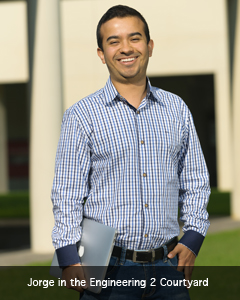
Jorge's thoughts on the academics at UCSB
Strengths of the graduate program
The Center for Control, Dynamical Systems, and Computation (CCDC) at UCSB – it is comprised of world-class professors, most of whom are at the top of their respective fields. Moreover, there is also a lot of collaboration between different research groups.
Favorite course
I have three favorite courses: 1) Nonlinear control systems, by Prof. Andrew Teel, where we learn the fundamental tools to analyze nonlinear dynamical systems, as well as to design control mechanisms for this type of systems. 2) Game Theory by Prof. Joao Hespanha, where a comprehensive mathematical description of game theory is presented, and where we also have the chance to apply in a final project the material learned during the class. 3) Network Systems by Prof. Francesco Bullo, where we study the fundamental mathematical tools to analyze networked systems via graph theory.
Experience with the graduate exams
Studying for the screening exam can be a little bit stressful mainly because there is a lot of material that needs to be reviewed. I would recommend forming a nice study group, where the collective learning experience ends up being beneficial for everybody. The qualifying exam was less stressful, and I actually had a great time having very stimulating conversations with the faculty in my committee.
Describe your experience as a Teaching Assistant (TA) and GSR
I was a TA for Feedback Control Systems: Theory and Design (147A), and Digital Control Systems: Theory and Design (147B). For both, I ran labs, graded homework, and made solutions for the homework sets. I enjoyed this experience. As a GSR, I have been doing research as part of Prof. Teel’s lab.
Life as a graduate student
Quality of life as a graduate student and how you balance school, work, social, and family life
Balancing work, social, and family life during grad school will always be a challenge. However, I try to go to Colombia every year to visit my family, and sometimes they also visit Santa Barbara. I make sure to talk to them every week.
Where have you lived?
I have lived at the UCSB residences during my graduate studies. This has been very convenient since they are located very close to the campus. Moreover, some of my friends from my department, as well as other departments, also live at the UCSB residences, therefore it is easy for us to meet regularly for dinner or just to relax after a deadline.
What did you do over summer break?
During the past summer I did an internship in Boston at the Mitsubishi Electric Research Laboratories (MERL). This was a very interesting experience, and I learned a lot from my colleagues and mentors at MERL. I also traveled to Europe to present a paper related to my research with Prof. Teel.
Advice to prospective graduate students
I think UCSB offers the complete package, i.e., top research programs with top faculty and world-class labs, one of the best locations in the United States, and a very friendly community.
Eric Stanton - Ph.D. Student in Electronics & Photonics
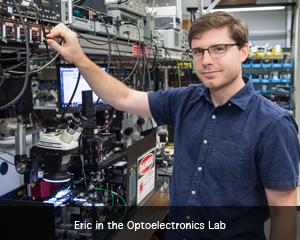
- Hometown: San Jose, CA
- B.S. Degree: Cal Poly, San Luis Obispo
- Degree sought from UCSB: M.S. (2014) and Ph.D. 6th year
- Group/Advisor: Optoelectronics Research Group / John Bowers
- Main area of research: Integrated photonics
- Research interests: Mid-infrared lasers, beam combing, frequency combs
- Master's Thesis title OR Dissertation title OR Topic: "High-brightness Lasers on Silicon by Beam Combining"
- Most important publication to date: E. J. Stanton, Alexander Spott, Nicolas Volet, Michael L. Davenport, and John E. Bowers. "High-brightness lasers on silicon by beam combining." In Proc. of SPIE 10108, 101080K-1 (2017)
- Stanton's Google Scholar page
- Important conferences attended: Conference on Lasers and Electro-Optics (CLEO)
- Types of financial assistance received: Teaching Assistantship (TA) and Graduate Student Researcher (GSR)
- Awards & honors received: IEEE Photonics Society, UCSB Student Chapter: 2016 Chapter of the Year and 2017 Most Innovative Chapter, while serving as the student president
- UCSB student organizations: IEEE Photonics Society UCSB Student Chapter – Student President
- Professional memberships: Institute of Electrical and Electronics Engineers (IEEE), The Optical Society (OSA), SPIE (the international society for optics and photonics)
- Hobbies: playing music, soccer, tennis, hiking, backpacking, skiing
Favorite things about
- ECE department: World-class faculty and laboratories
- UCSB: Great location and it’s not over-crowded
- Santa Barbara: Beautiful location with beaches and mountains
Tell us about your research
My research has focused on combing the power from many lasers of different colors into a single output beam. It has involved design, fabrication, and laboratory characterization. Funding for our project comes from the Office of Naval Research and the Air Force Research Laboratory. Our primary partner has been the Naval Research Laboratory and we have also collaborated with the University of Wisconsin, Northrop Grumman, the National Institute for Standards and Technology, and Cal Tech.
How and why did you get into your area of research?
I was drawn to optics in my first year of undergraduate during a physics course, so I decided to take on a physics minor with emphasis in optics and photonics in addition to my electrical engineering major. During my second, third, and fourth years, I worked with a satellite group on campus and this got me interested in research. I decided to pursue photonics in graduate school because it is fundamental and applies to a wide range of applications. Also, due to the high frequencies of light compared to radiofrequencies, the next generation of communication and sensor systems should all be based on photonics.
Why did you select UCSB and ECE in regards to your research?
John Bowers is well known for developing the first practical laser integrated on silicon. This is important because silicon is the third most abundant element on earth and we can easily extract it into a high-quality crystalline form. For this reason, it is ubiquitous in electronics fabrication, which has the most mature facilities and processes for nano-fabrication. For years, integrating a laser on silicon seemed too difficult, though it was regarded as the “holy-grail” of photonics that would jump-start a whole new era of this field. In John’s group, we are now applying this technology to new applications and there is a lot of momentum to develop technologies such as LIDAR, gyroscopes, mid-infrared lasers for gas sensing, frequency combs for high precision measurements, and electronic-photonic integration to increase the scale many of these systems.
What do you find rewarding about your research?
There is a lot of interest in my research and it clearly has a large impact on our community. It is nice to see a lot of competition internationally to achieve similar goals and learn from each other’s work.
UCSB prides itself on its collaborative atmosphere, give some examples of how you collaborate
Well, I work directly with my advisor to achieve the goals of our projects and discover new and interesting scientific properties of the materials and devices that we work on. Often, we talk to other faculty in our department or on campus for advice on solving a certain problem or to launch a new project that requires their specialty. Our group often works with Dan Blumenthal, Jonathan Klamkin, Larry Coldren, Clint Schow, Luke Theogarajan, Carl Meinhart, Arthur Gossard, and others more infrequently. I have given a tutorial on some of the devices that I design to students from some of these groups. Our group has also collaborated with Philip Lubin’s group in the Physics department to help them understand the latest advances in our field so they can apply them to a space exploration project. They are trying to send very small satellites to our nearest star, Alpha Centauri, which is about 4.4 light years away. I also work in the cleanroom and all the users there typically share information about process recipes.
Thoughts on working in a group research environment and your experience working with an advisor
My group is full of highly qualified people and we have some social gatherings throughout the year, thanks to John! We go to Colorado for a ski trip and we gather at John’s house near the a few times a year to celebrate graduations or the holidays. John is an expert is his field and he is an expert mentor, always supporting his students to succeed.
Where will your research take you next?
I very much enjoy my research and I am pursuing various options to continue in this field as a postdoc. Eventually, I would like to join a university as a faculty member.
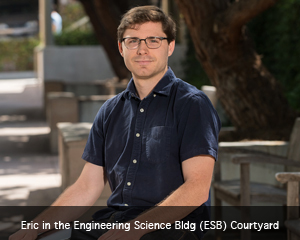
Eric's thoughts on the academics at UCSB
Strengths of the graduate program
UCSB has a strong integrated photonics program. In fact, some specialized laboratories in the U.S. only hire photonics engineers from a short list of about 3 schools, and UCSB is on that list!
Favorite course
Professor Larry Coldren’s course on diode lasers and photonics.
Experience with the graduate exams
The screening exam preparation is a great learning experience. I felt like the courses just gave me an idea of the topics that I would be tested on. Then, I worked primarily with two other students to study for the exam. It was a great study group since we were all able to teach each other a little bit. The qualifying exam was much less stressful. Instead, it was an amazing opportunity to get ~4 faculty members to sit down and listen to me speak about my research.
Describe your experience as a Teaching Assistant (TA) and Graduate Student Researcher (GSR)
I was a TA during my first year for an electro-magnetic and for an electronics undergraduate course. For both, I graded homework sets, ran labs or extra lectures, proctored exams, and made solutions for the homework sets. As a GSR, I focused on my research projects in John’s group.
Life as a graduate student
Quality of life as a graduate student and how you balance school, work, social, and family life
My life-balance during graduate school has gone in waves. In the first year, I had a bit more time to play intramural sports, music, and socialize. Over the rest of my time here, I’ve had varying amounts of time to spend on the extra-curricular activities. Sometimes, when there is good momentum with a research project, it is good to spend a lot of time on it and get a great result in the end. Then there is time afterwards to relax and level-out again.
What is your social life like and where have you lived?
I lived in the graduate student housing my first year (San Clemente), which was very convenient since I was busy with my undergraduate thesis and I didn’t have time to worry about house-hunting near UCSB. I moved in with a group of friends to a house in Goleta for my second year. Since my third year, I’ve lived near downtown Santa Barbara and I prefer being there.
What did you do over summer break?
As a GSR, summer is no different than any other time of the year. Summer is a great time to be doing research at UCSB because it is very quiet.
Advice to prospective graduate students
It has been a great experience for me and I highly recommend graduate student life at UCSB
Chitra Karanam - Ph.D. Student in Communications and Signal Processing
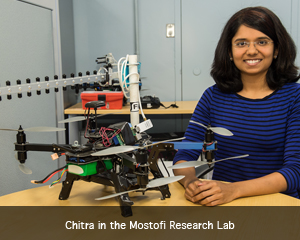
- Chitra Karanam (webpage) | X-ray Eyes in the Sky: Drones and WiFi for 3D Through-Wall Imaging (YouTube)
- Hometown: Hyderabad, India
- Degrees: Bachelor and Master of Technology from Indian Institute of Technology Madras (IITM), M.S. from UCSB
- Degree sought from UCSB: Ph.D. in Electrical and Computer Engineering (3rd year)
- Group/Advisor: The Mostofi Group / Professor Yasamin Mostofi
- Main area of research: Signal Processing and RF Sensing
- Research interests: RF Sensing and Imaging, Array Signal Processing, Robotics
- Most important publication to date: "3D Through-Wall Imaging with Unmanned Aerial Vehicles Using WiFi," 16th ACM/IEEE International Conference on Information Processing in Sensor Networks (IPSN), April 2017
- Important conferences attended: I gave a talk at the ACM/IEEE International Conference on Information Processing in Sensor Networks (IPSN)
- Types of financial assistance received: Graduate Student Researcher (GSR) and Teaching Assistantship (TA)
- Professional memberships: IEEE Student member
- Hobbies: Reading, hiking, squash
Favorite things about
- ECE department: The friendly faculty and students, who are always ready to help and chat. Also, the location of the department, and a view of the ocean from my desk in lab!
- UCSB: It’s a beautiful campus, with a diverse community and a variety of events and talks that interest many students
- Santa Barbara: The wonderful weather all year long and the scenic location of the city
Tell us about your research
Our lab works on problems at the intersection of communication and robotics. My research is in the field of RF Sensing and Imaging with robots. RF signals are present everywhere these days, and they carry a lot of information about our surroundings. Signals like WiFi can even pass through walls and reflect off people and other objects present in any area. Broadly, I work on using RF signals like WiFi to see through walls and image the area located on the other side of the wall. I use unmanned ground vehicles and octo-copters to collect wireless measurements outside an unknown area. Then, through an extensive modeling of the interaction of such signals with the area of interest, I reconstruct an image of the unknown area. In the past, there has been a lot of work in our lab on reconstructing a 2D image of the unknown area, and I am currently working on 3D image reconstructions, through walls, using drones with WiFi.
How and why did you get into your area of research?
At an internship during my undergrad, I worked in the field of array signal processing, and I found the related algorithms and ideas very interesting. Later in grad school, when I got a chance to work on RF sensing and robotics, I realized that this would be a great opportunity to explore more avenues along the lines of my undergrad internship.
Why did you select UCSB and ECE in regards to your research?
The ECE department at UCSB has a great reputation. I first applied for the Masters program, and after arriving here, I liked the atmosphere at the department, and the research in my advisor Professor Yasamin Mostofi’s group. I then decided to pursue my Ph.D. here as well.
What do you find rewarding about your research?
When our proposed methodology and design works well in practice in our experiments.
UCSB prides itself on its collaborative atmosphere, give some examples of how you collaborate
Some or the other form of collaboration is essential for research. In our group, we frequently discuss and collaborate on various ideas and projects, and I feel this helps immensely whenever anyone feels stuck in a problem. We regularly meet with our advisor to discuss research. Other faculty in the department are also always easily approachable, whenever we want to discuss any topic or problem.
Thoughts on working in a group research environment and your experience working with an advisor
When working on a research problem, it helps a lot to be able to discuss it with others in the research group. I am glad to be working in a group where we constantly discuss and help each other with various aspects of research. I have also had a great experience working with my advisor. She is always supportive and meets with us regularly to discuss progress on research.
Where will your research take you next?
In the future, I would like to be working in the industry, on RF sensing related applications.
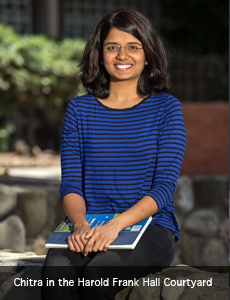
Chitra's thoughts on the academics at UCSB
Strengths of the graduate program
The diverse research fields and associated faculty, the various research groups, and how everyone is easily approachable to discuss various ideas or problems.
Experience with the graduate exams
The screening exam can be a bit stressful. It is the first major exam during the Ph.D. program and tests the basic knowledge of various undergrad and initial graduate courses. Having a plan for a systematic preparation helped reduce some of the stress. The qualification exam was less stressful, since it is a presentation on our research, and I had a stronger grasp on the material I had to present.
Describe your experience as a Teaching Assistant (TA) and GSR
I have mostly been a GSR. I was a TA for an undergrad course - Probability and Statistics. I had to conduct discussion sessions where I go over the topics and examples taught by the professor that week. It was a great learning experience for me, to read up about the topics and be ready to answer the various questions that the students might have.
Life as a graduate student
Quality of life as a graduate student and how you balance school, work, social, and family life
Overall, I think the quality of life is good here at UCSB. Research takes up a lot of my time, and sometimes it gets challenging to balance work and personal life. During deadlines, it is difficult to set time apart for any other activities. But then, at other times, it’s not so hectic and I try to plan a few fun activities and relax.
What is your social life like and where have you lived?
I live at San Clemente Villages – the grad student on-campus housing. I like living at San Clemente because of the proximity to the campus and the facilities that are available. It is pretty convenient since most graduate students stay at the grad housing.
What will you be doing over summer break?
I will be staying at UCSB and working on research this summer.
Advice to prospective graduate students
There are a lot of opportunities to learn, through courses, interaction with faculty, interesting talks and seminars – try to make the best use of everything.
Celeste Bean – B.S./M.S. Student in Controls
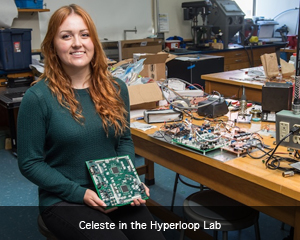
- Hometown: Los Angeles, CA
- Degrees Sought: B.S. / M.S. Program - B.S. CE, 2016 and M.S. EE (1st year)
- Graduate Study Area: Electrical & Computer Engineering - Control Theory
- Advisor: Professor Francesco Bullo, Mechanical Engineering
- Research Interests: renewable energy, power grid development
- What types of Financial Assistance have you receive? Graduate Student Researcher and Teaching Assistant
- Awards & Honors Received: Outstanding Teaching Assistant
- UCSB Student Organizations: UCSB Hyperloop
- Professional Memberships: International Electrical and Electronics Engineers (IEEE) Student membership
- Hobbies: Brazilian Jiu Jitsu, reading (history, philosophy, science fiction), writing, podcasts, politics
- Interesting Aside about You: I have been to six continents
Favorite things about
- ECE department: the accessibility of the professors, senior project classes
- UCSB: The collaborative atmosphere, emphasis on entrepreneurship, friendliness of peers, Campus Point
- Santa Barbara: McConnell’s ice cream, hiking, general emphasis on health
Celeste and her UCSB Senior Project experience
Celeste completed her B.S. in Computer Engineering from UCSB in 2016. During her senior year, she took the required two quarter Senior Computer Systems Project (ECE 189A/B) course also known as the Senior "Capstone" Project. As a graduate student she has been the Teaching Assistant for both quarters of the course. We asked Celeste to share her Capstone experience with us:
- Student Experience: My senior design project was easily my most formative experience at UCSB. I worked with twenty senior Engineering students to develop a proof of concept for SpaceX’s Hyperloop competition, which involved building a magnetically levitating pod from scratch for transit in a low-pressure tube. Doing so allowed me to take the training wheels off of everything that I’d learned in my classes and apply my knowledge to a problem that didn’t have a known or even promised solution.
- Teaching Assistant Experience: Transitioning to a role as Teaching Assistant for our Computer Engineering senior project class gave me huge insight into learning, both my own and my students’. It’s been hugely gratifying to watch their progression as engineers in just one year and I’ll be very proud to share our Alma Mater.
Celeste and her research
Tell us about your research
My research involves designing, analyzing, and modeling self-sustaining inverter-based microgrids in the presence of variable renewable generation and battery storage and implementing controller schemes on experimental inverters. Incorporating renewable energy onto the power grid is critical in ensuring energy security for the world’s population, but it’s not as simple as just plugging in a solar panel.
My experience leading UCSB’s Hyperloop team also gave me an unparalleled experience in collaboration. I have been able for two years to be a leader on a high-budget, multi-disciplinary (ME, EE, CE, CS, Physics), project with more than ten industry sponsors and more than six advisors.
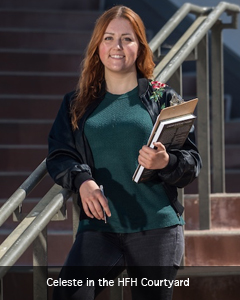
How and why did you get into your area of research?
I found my fascination with power grid development during my second internship at Los Alamos National Laboratory, where I worked with Ray Newell and Glen Peterson on their Quantum Cryptography project to advance the security of the national power grid. After learning about all the inspiring research in field, I knew that I wanted to involve myself in facilitating the advance of renewable energy. Advancing the infrastructure itself can offer huge opportunities for people, especially as nations rapidly develop and deliver power to new populations.
Why did you select UCSB and the ECE Department in regards to your research?
I knew I wanted to work on the power grid, and taking undergraduate classes in UCSB’s Center for Control, Dynamical-Systems, and Computation (CCDC) prompted me to choose controls as my specific venue given its elegant and robust solutions to an incredible variety of problems. There are very few problems to which a controls approach cannot be applied.
What do you find rewarding about your research?
I am very gratified by the fact that my research directly supports the expansion of renewable energy.
UCSB prides itself on its collaborative atmosphere, give some examples of how you collaborate
My project involves a collaboration of researchers from the National Renewable Energy Lab (NREL), the University of Minnesota, and UCSB, with additional involvement from industry to implement the results. I will be travelling to Golden, Colorado this summer for a summer internship at NREL to continue my experimental work.
Thoughts on working in a group research environment and your experience working with an advisor
I couldn’t enjoy my group more. People are very friendly, helpful, and supportive and enjoy discussion on all topics, from power electronics to materials science to sociology. I find their general curiosity and diligence in their research makes me a better researcher. My advisor, Professor Bullo, is also spectacular. He is exceptionally cheerful, a huge wealth of knowledge, and genuinely wants to see his students succeed.
Where will your research take you next?
I started as a 1-year MS/BS student but enjoyed my research so much that I extended my Master’s to two years and intend to apply for PhD programs in Fall 2017.
Celeste's thoughts on the academics at UCSB
Strengths of the graduate program
In my experience, UCSB’s professors are both exceptional researchers and excellent teachers. That combination of skills naturally means that I find classes to be very clear but also speaks to the general ability to communicate even the most advanced ideas.
Favorite course
ECE 594, Special Topics: Mechanism Design in Game Theory with Professor Jason Marden. As with control theory in general, I am very interested in the wide array of problems to which game theory is applicable. Special Topics classes are always fun because professors can lecture on topics in which they are personally interested, and that enthusiasm carries over to their teaching. That’s definitely true for Professor Marden—he’s able to get the whole class excited (even on Monday mornings!). Another great thing about Special Topics classes is that they can spawn collaboration with the professor. I know a number of people who have found projects or even their advisor through Special Topics.
Describe your experience as a Teaching Assistant (TA) and Graduate Student Researcher (GSR)
I’ve TA’d both Computer Engineering’s senior project class and a Sensor/Peripheral Interfacing lab class, both of which really deepened my understanding of the topics and ability to synthesize and convey information. The experience dramatically developed my ability to troubleshoot—it’s amazing how “creative” students’ solutions in code and circuitry can sometimes be!
Life as a graduate student
Quality of life as a graduate student and how you balance school, work, social, and family life
Managing school, friends, and hobbies can be stressful, but I’ve found that keeping a reasonably strict routine keeps me sane. I keep my Sunday afternoons free to get ready for the week, train Brazilian Jiu Jitsu in the mornings, and treat school as a job, with the aim of working productively from ~9 am-~7 pm every week day with whatever extra work spilling onto the weekends. Time blocking rather than to-do lists keep me on track.
Where have you lived while at UCSB?
I live in San Clemente (UCSB Housing) this year and plan to do the same next year. A lot of my friends from undergrad at UCSB are still in Santa Barbara, and I’ve made some very dear friends with fellow graduate students. I make time to spend with the people I care about because I know that for myself, pushing past my limits of focus has very diminishing returns, so I make efforts to spend time with people and on things that bring me joy outside of school.
What do you do over the summer?
I will be traveling for three weeks to Africa then continuing work on my research at the National Renewable Energy Laboratory in Golden, Colorado.
Advice to prospective graduate students
I try to find time every day to do something that makes me remember how lucky I am to be here. I also try to make sure that I have things that I am looking forward to that are separate from school, whether that be a concert, a barbecue, or seeing a friend. Take advantage of the great events that the Graduate Student Association puts on, such as free pizza, open yoga, or beer socials.
Most importantly, take care of your physical and mental health. You’re an engineer, and your body is one of the most advanced engines you’ll ever see!
Chong Zhang – Ph.D. Student in Electronics & Photonics
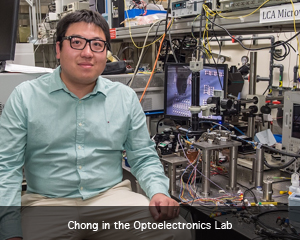
- Hometown: Luoyang, China
- Degrees: Undergraduate – Harbin Institute of Technology, China and Masters – Zhejiang University, China
- Degree sought from UCSB and Progress: Ph.D. 6th year
- Graduate Study Area: Electronics & Photonics – Si photonics (SiP), photonic integration circuit (PIC)
- Group / Advisor: Optoelectronics Research Group / Professor John E. Bowers
- Research Interests: photonic integration, optical interconnection, semiconductor laser, modulator
- Important Awards and Honors: Herbert Kroemer Dissertation Fellowship
- Professional Memberships: Institute of Electrical and Electronics Engineers (IEEE), The Optical Society (OSA)
- Hobbies: Basketball, Photography
- Interesting aside about Chong: Good cook, "The Pacifier"
Favorite things about
- ECE department: The UCSB nanofabrication cleanroom and testing facility
- UCSB: Quiet campus, energetic students and nice sea view
- Santa Barbara: Moderate climate and polite people
More about Chong and his research
- Important Conferences attended: Conference on Lasers and Electro-Optics (CLEO), Optical Fiber Communication Conference (OFC), IEEE Optical Interconnects Conference (OI Conference) — More of Chong's Pubs
- Most important publications to date: Conference on Lasers and Electro-Optics (CLEO), Optical Fiber Communication Conference (OFC), IEEE Optical Interconnects Conference (OI Conference) and more
- Dissertation title: “Heterogeneous Integrated Photonic Transceiver on Si”
- Types of financial assistance received: Graduate Student Researcher (GSR)
Tell us about your research
My research emphasis is optical interconnections with highly integrated of photonic circuits. Like electrical circuits with billions of transistors on a single chip, photonic integration circuit (PICs) are capable of jointing a large number of functional optical components (e.g. waveguide, semiconductor lasers, modulators, photodetectors) on single chip in order to realize complex functionalities and superior performance. This is a promising solution for future high-speed, ultra-compact, cost and power effective optical interconnections by scaling down the device footprint and scaling up the integration density.
We are most interested in silicon – one of the richest elements on earth, which is one the best options for optical integration by means of the availability of large wafers (up to 450 mm in diameter nowadays) with lower unit prices. Additionally, high-density photonic integration on silicon benefits from the advanced CMOS fabrication techniques that are developed by the IC industry. We, here at UCSB, have built a platform on silicon photonic integrations – including silicon components as well as other materials heterogeneously integrated on silicon e.g. indium phosphide based quantum wells (QWs) and gallium arsenide based quantum dots (QDs) for efficient laser sources on silicon.
I would like to mention the American Institute for Manufacturing Integrated Photonics (AIM Photonics) project at UCSB. As the West Coast Hub of AIM Photonics, the UCSB photonic groups are aiming to accelerate photonic integration to overcome the data communication bottleneck in next decade and convert this achievement to into manufacturing productivity.
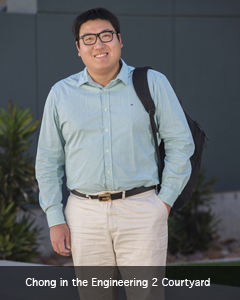
How and why did you get into your area of research?
The field became more and more attractive to me when I studied it further. This is an integrated discipline that requires different background knowledges and skills. I am big fan of engineering. Designing and fabricating devices from sketches gives me a strong sense of accomplishment. I feel confident and excited in this field because I believe it is fast-growing and plays a critical role in modern IT technology that will also play a more important part of our future daily lives.
What do you find rewarding about your research?
We are living in the “information blasting” age, enabled by the fast-growing information technologies, including modern optical communication technology. Not only is the world connected by light through the submarine optical fiber cables, today’s internet network is enabled by high speed optical links in data centers. In the near future, optical interconnections will replace copper wire and pins in short links, e.g. between the processor and memory or among the processor cores in the computer, in order to solve the current I/O bandwidth bottleneck. Such chip-level optical communications require large bandwidth density, low power consumption, so there is a strong motivation to develop high integration density, high performance and low volume photonic integration circuit. As a milestone for this application, we have just achieved a state-of-the-art, highly integrated transceiver network on a single silicon chip with hundreds of effect units with a maximum transmission speed up to Terabit per second – which corresponds to a data rate that can transmit 50 channels of 4K media in one second!
Why did you select UCSB and ECE in regards to your research?
I don’t think I can find a better place than UCSB to work in the research field that I am working in. UCSB has been a leader in the photonic integration area for the past 30 years and is now the West Coast Hub of AIM photonics. Plus my advisor Prof. John Bowers is a pioneer in the field of silicon photonics. The close relationship between the ECE department with industry as well as the beautiful beach outside the ECE Department’s building strengthened my determination to come here.
UCSB prides itself on its collaborative atmosphere, give some examples of how you collaborate with others
Indeed, teamwork is always the key in solving difficult issues in research work. The ‘team’ includes my advisor, experts in the group and department, and collaborators outside of UCSB. We have routine meetings and constant one-to-one discussions throughout the project timeline. We report progress, discuss issues and concerns, exchange opinions and make decisions. The meetings and discussions are critical in research work for proper planning – firstly, being prepared and concise can make communication efficient and secondly, it’s equally important to have independent opinions in the collaborations. Knowing each collaborator’s role on the team and understanding one’s strengths and weaknesses helps make correct decisions when working in a group. This is where I would like to thank my advisor, Prof. John Bowers, who is always open-minded and allows us space to think freely in our research projects.
Thoughts on working in a group research environment and your experience working with an advisor
From my own experience, my suggestions to all of UCSB’s potential grad students:
1) Keeping motivated is most important. Passion is the only key to help you pass through the difficult journey of research work, plus I think it is also the top personality trait that advisors would like to see.
2) Always bring your thoughts and ideas when talking with your advisor and teammates.
3) Take advantage of the resources around you. We are spoiled here at UCSB and one should not waste the opportunity to access the field experts, funding resources and various facilities.
Where will your research take you next?
I just finished up my Ph.D. research work this past summer and joined the photonic research group at Hewlett Packard labs, which is one of the leading teams in silicon photonics area. I feel very excited to move to the next stage of my career. The team I am working with is dedicated to developing a photonic solution for future high performance computers. I believe we will experience a revolutionary period in next the decade or two in this field – photonic integration as an enabling technique will change the way we think about computers, or “machines” in general, and the way “machines” change our lives. I am honored to be part of this evolution and I can’t wait to see what will happen next.
Life as a graduate student
Quality of life as a graduate student and how you balance school, work, social, and family life
I have to say that there’s quite a bit of pressure being a graduate student researcher. The pressure comes from balancing the project side, my advisor’s anticipations, and also the work with the colleagues in my group and department. It is also a wonderful training process for my career and for working with personalities and because of it I can clearly see my growth and improvement. I live with my family in town. We had our first child in 2014 and since then we have become even busier but everything is delightful. I don’t think I have done a good job balancing my school and family time and I always feel guilty that I didn’t spend enough time with them. But family recharges me for the hard research life at school and they are also my biggest motivation for working hard.
Social life and living in Santa Barbara
I have moved a few times around right outside of campus in Goleta, from UCSB graduate student housing and to a public apartment in town and then back to family housing after our kid was born. Our favorite place to live was at UCSB family housing, where the rent was more reasonable, and more importantly, we got to know many friendly neighbors. Santa Barbara is probably the best place I can think of to stay for a long time, especially if you live with kids. I am so glad we could stay here after I graduated and continue to enjoy the sweet climate and the charming environment.